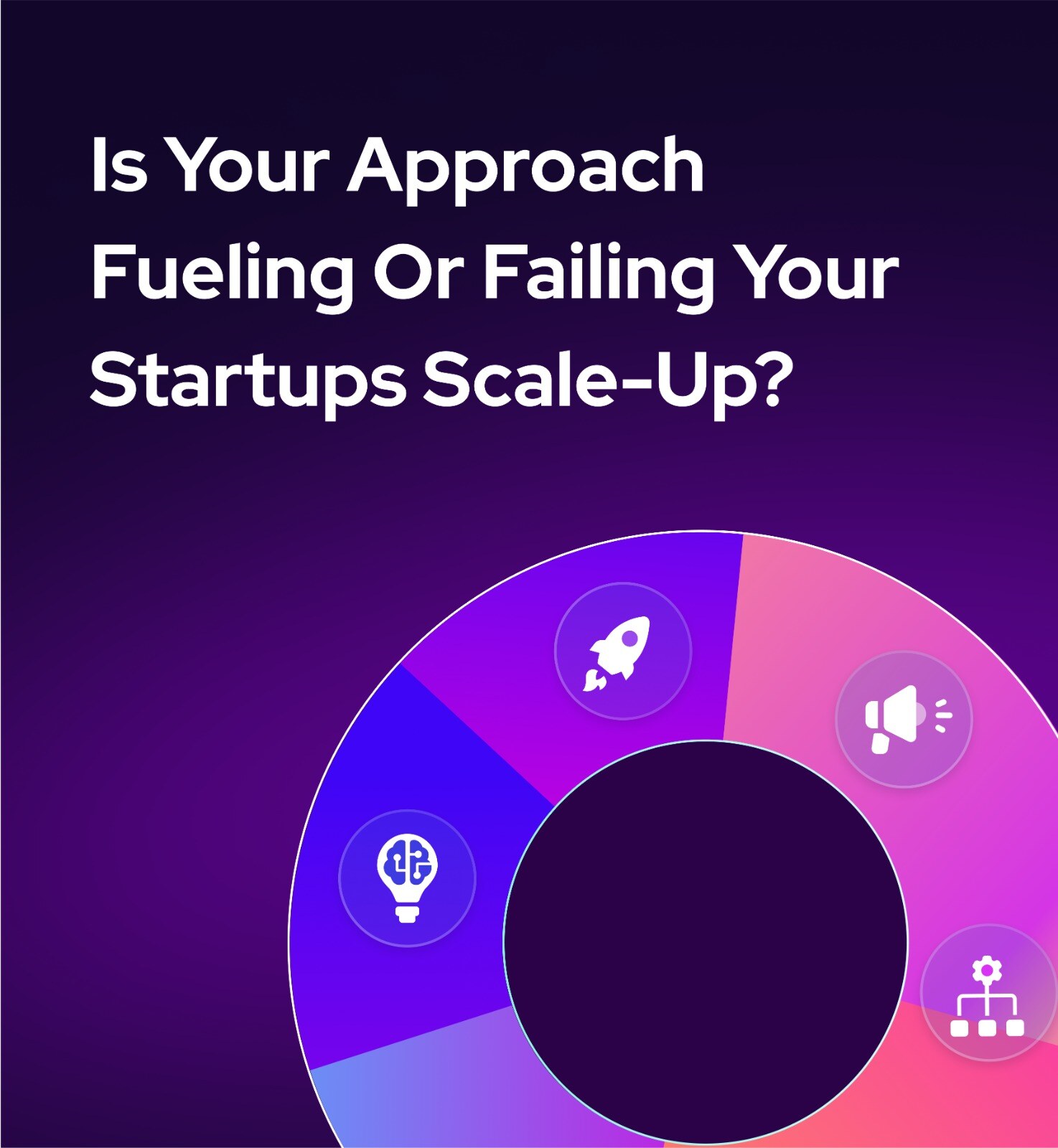A Framework for Scaling a Business: Scaleup Methodology
In today's rapidly evolving business landscape, scaling a company is both an exciting opportunity and a daunting challenge. As organizations grow, they often encounter obstacles that can hinder their progress and threaten their survival. This is where having a robust framework for scaling a business becomes crucial.
Enter the Scaleup Methodology – a comprehensive, innovative approach designed to help businesses navigate the complexities of growth and achieve sustainable success.
In this extensive guide, we'll delve deep into the Scaleup Methodology, exploring how it serves as an essential framework for scaling a business. We'll uncover its core principles, key components, and practical applications, providing you with the insights and tools needed to propel your organization to new heights.
The Need for A Framework for Scaling a Business:
Before we dive into the specifics of the Scaleup Methodology, it's important to understand why having a structured approach to scaling is so critical. Many businesses fail not because of poor products or lack of market demand, but due to the inability to manage rapid growth effectively. A well-designed framework for scaling a business addresses common pitfalls such as:
- Operational inefficiencies
- Inconsistent product quality
- Difficulty in maintaining company culture
- Cash flow management challenges
- Talent acquisition and retention issues
The Scaleup Methodology serves as this crucial framework, offering a holistic approach to tackling these challenges and more.
The Scaleup Methodology: A Comprehensive Framework for Scaling a Business
The Scaleup Methodology is built on seven fundamental pillars, each addressing a critical aspect of business growth. Let's explore each of these pillars in detail:
- SALES: Developing a Comprehensive Digital Sales Strategy
At the heart of any successful business scaling effort is a robust sales strategy. The Scaleup Methodology emphasizes the importance of a digital-first approach to sales, recognizing the increasingly important role of online channels in modern commerce.
Key components of this pillar include:
a) Strategy: Defining your target audience and value proposition b) Awareness: Creating and distributing valuable content c) Leads: Implementing lead generation and nurturing strategies d) Engagement: Developing personalized communication approaches e) Sales: Optimizing your sales process and team
By focusing on these elements, businesses can create a scalable sales engine that drives consistent growth. This pillar of the framework for scaling a business ensures that as your company expands, your ability to attract and convert customers grows proportionately.
- CONTINUOUS DELIVERY: Enhancing Product Delivery Through Advanced Engineering Practices
In today's fast-paced market, the ability to rapidly iterate and improve your product is crucial. The Continuous Delivery pillar of the Scaleup Methodology focuses on implementing advanced engineering practices to streamline your product development and delivery processes.
This pillar encompasses:
a) Rigor: Establishing coding standards and best practices b) Agility: Implementing Agile methodologies c) Probing: Ensuring comprehensive testing and quality assurance d) Insights: Utilizing data-driven development practices e) Deployment: Automating and streamlining your deployment process
By adopting these practices, businesses can maintain product quality and innovation speed even as they scale, a critical component of any effective framework for scaling a business.
- AGILITY: Embracing Rapid Change and Fostering Innovation
In a world where change is the only constant, agility is not just an advantage – it's a necessity. The Agility pillar of the Scaleup Methodology focuses on creating an organizational structure and culture that can adapt quickly to market changes and foster continuous innovation.
Key aspects of this pillar include:
a) Mindset: Cultivating an Agile mindset across your organization b) Methodologies: Implementing appropriate Agile frameworks c) Scrum Master: Leveraging the Scrum Master role effectively d) Product Owner: Empowering your Product Owners e) Teams: Building high-performing, cross-functional teams
This pillar ensures that as your business scales, it retains the flexibility and innovative spirit often associated with smaller, more nimble startups.
- LANDSCAPE: Implementing Comprehensive Business Intelligence
As organizations grow, maintaining a clear view of overall business performance becomes increasingly challenging. The Landscape pillar of the Scaleup Methodology addresses this by focusing on implementing comprehensive dashboards and business intelligence tools.
This pillar includes:
a) Executive Overview: Tracking high-level business performance b) Sales and Marketing: Monitoring campaign effectiveness c) Product Development: Overseeing feature progress and product health d) Financial Performance: Keeping a pulse on financial metrics e) Customer Success: Measuring customer satisfaction and engagement
By implementing these dashboards, businesses gain a 360-degree view of their operations, enabling data-driven decision-making crucial for effective scaling.
- EVOLUTION: Creating an Organization Ready to Scale
The Evolution pillar focuses on preparing your organization structurally for growth. This is a critical component of any framework for scaling a business, as it ensures that your company's design can support and facilitate expansion.
Key elements of this pillar include:
a) Translate Strategy into Daily Operations: Aligning your team with your vision b) Value Streams and Lean Budgeting: Optimizing resource allocation c) Drive Continuous Improvement: Fostering a culture of innovation d) Create a Learning Organization: Facilitating knowledge sharing e) Drive Innovation: Implementing strategies to stay ahead of the curve
This pillar helps businesses avoid the common pitfall of outgrowing their organizational structure, ensuring that the company can evolve alongside its increasing size and complexity.
- UPGRADE: Enhancing Talent Acquisition and Development
As businesses scale, their need for talent grows exponentially. The Upgrade pillar of the Scaleup Methodology focuses on creating robust processes for attracting, developing, and retaining top talent.
This pillar encompasses:
a) Find: Sourcing top talent effectively b) Onboard: Creating a smooth integration process for new hires c) Cultivate: Developing and retaining team members d) Utilize: Leveraging recruitment tools and strategies e) Select: Choosing the best candidates through rigorous processes
By focusing on these areas, businesses can ensure they have the human capital necessary to support and drive their growth.
- PRODUCT: Developing and Refining Products Through a Customer-Centric Approach
At the core of any successful business is a product that meets market needs. The Product pillar of the Scaleup Methodology emphasizes the importance of continuous product refinement and development.
Key components of this pillar include:
a) COMPASS: Defining your product vision and roadmap b) RESEARCH: Validating market needs through rapid experimentation c) ASSESS: Defining and assessing key product performance indicators d) Frame: Planning and executing successful go-to-market campaigns e) Tune: Optimizing a successful pricing strategy
This pillar ensures that as businesses scale, their products continue to evolve and meet changing market demands.
Implementing the Scaleup Methodology: A Practical Guide
Now that we've explored the seven pillars of the Scaleup Methodology, let's discuss how to implement this framework for scaling a business in practice.
- Assessment and Goal Setting
Begin by conducting a thorough assessment of your current business state. Identify areas of strength and weakness across each of the seven pillars. Based on this assessment, set clear, measurable goals for improvement in each area.
- Prioritization
While all seven pillars are important, trying to improve everything at once can be overwhelming. Prioritize your efforts based on your assessment results and business goals. Focus on the areas that will have the most significant impact on your scaling efforts.
- Create a Roadmap
Develop a detailed roadmap for implementing improvements across each pillar. This should include specific actions, timelines, and responsible parties.
- Build Cross-Functional Teams
The Scaleup Methodology emphasizes the importance of cross-functional collaboration. Form teams that include members from different departments to work on implementing improvements in each pillar.
- Implement Agile Practices
Adopt Agile methodologies not just in your product development, but across your entire organization. This will help you iterate quickly and adapt your scaling efforts as needed.
- Leverage Technology
Invest in tools and technologies that can support your scaling efforts. This might include CRM systems for sales, CI/CD tools for continuous delivery, BI platforms for landscape analysis, and HRIS systems for talent management.
- Foster a Culture of Continuous Improvement
Encourage all team members to constantly look for ways to improve processes and outcomes. Implement regular review and retrospective sessions to identify areas for improvement.
- Measure and Adjust
Regularly measure your progress against your goals. Be prepared to adjust your approach based on these results. Remember, scaling is not a linear process – it requires constant adaptation and refinement.
Overcoming Common Challenges in Scaling
Even with a robust framework for scaling a business like the Scaleup Methodology, challenges are inevitable. Here are some common obstacles you might face and how to address them:
- Resistance to Change
As you implement new processes and systems, you may encounter resistance from team members accustomed to old ways of working. Address this by clearly communicating the reasons for change, involving team members in the process, and providing adequate training and support.
- Maintaining Company Culture
Rapid growth can sometimes dilute company culture. Combat this by clearly defining and regularly reinforcing your company values. Ensure that your hiring and onboarding processes align with these values.
- Cash Flow Management
Scaling often requires significant investment, which can strain cash flow. Implement robust financial forecasting and management practices. Consider seeking additional funding if necessary.
- Keeping Up with Market Changes
As you scale, staying attuned to market changes becomes more challenging. Implement regular market research practices and maintain close relationships with your customers to stay ahead of trends.
- Technical Debt
Rapid growth can sometimes lead to shortcuts in technical implementation, resulting in technical debt. Address this by allocating time and resources for refactoring and system improvements alongside new development.
Conclusion
The journey of scaling a business is filled with challenges and opportunities. The Scaleup Methodology provides a comprehensive framework for scaling a business that addresses these challenges head-on, offering a structured approach to growth that encompasses all aspects of your organization.
By focusing on sales, continuous delivery, agility, landscape analysis, organizational evolution, talent management, and product development, the Scaleup Methodology ensures that your business is well-equipped to handle the complexities of rapid growth.
Remember, implementing this framework is not a one-time effort, but an ongoing process of adaptation and improvement. It requires commitment, flexibility, and a willingness to continuously learn and evolve.
As you embark on your scaling journey, keep the principles of the Scaleup Methodology at the forefront of your strategy. Regularly assess your progress, celebrate your successes, and don't be afraid to pivot when necessary. With this robust framework for scaling a business as your guide, you'll be well-positioned to navigate the challenges of growth and achieve sustainable, long-term success.
The business world is constantly evolving, and the ability to scale effectively can be the difference between thriving and merely surviving. By embracing the Scaleup Methodology as your framework for scaling a business, you're not just preparing for growth – you're positioning your organization to lead in the rapidly changing landscape of modern business.
Disclaimer
This blog post was initially generated using Inno Venture AI, an advanced artificial intelligence engine designed to support digital product development processes. Our internal team has subsequently reviewed and refined the content to ensure accuracy, relevance, and alignment with our company's expertise.
Inno Venture AI is a cutting-edge AI solution that enhances various aspects of the product development lifecycle, including intelligent assistance, predictive analytics, process optimization, and strategic planning support. It is specifically tailored to work with key methodologies such as ADAPT Methodology® and Scaleup Methodology, making it a valuable tool for startups and established companies alike.
Inno Venture AI is currently in development and will soon be available to the public. It will offer features such as intelligent product dashboards, AI-enhanced road mapping, smart task prioritization, and automated reporting and insights. If you're interested in being among the first to access this powerful AI engine, you can register your interest at https://innoventureai.com/

Take The Test
You May Also Like
These Related Stories

Scaling your Fintech Startup with the Scaleup Methodology

Scaling Your HealthTech Startup With the Scaleup Methodology

